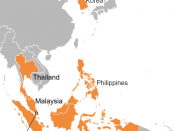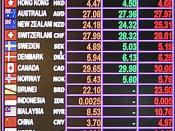The Asian Economy Crisis
The following discourse will outline two different viewpoints of the causes for the East~ Asian economic crisis. We will discuss the possible remedies and methods of prevention for such a crisis in the future and the reasons for and against certain exchange rate regimes.
It was mid-1997; the' Asian Miracle' was still in full bloom when the Asian economic crises erupted. What followed were sharp decreases in currencies, stock market crashes and a major devaluation of other assets in a number of Asian countries. Hardest hit was Thailand, Indonesia, Korea, Malaysia and the Philippines. Totally unexpected and beyond control, the crisis threatened the financial systems of those countries and disrupted their real economies, causing large contractions in activity and created a human crisis as well as a financial one. Furthermore, the ripples from the East Asian disaster were felt worldwide in the international financial markets where world trade and growth suffered well into the late 90s.
In the aftermath of the crisis, two main hypotheses have emerged; one of financial panic and the other of financial instability in the affected region. These two arguments should not however be thought of as distinct and opposing each other but are interrelated to a certain extent.
The financial panic explanation for the economic crisis can be mainly linked to Harvard's Jeffrey Sachs. In Radelat and Sachs (1998) paper, they pointed out that while the East Asian economies such as Thailand, Korea and Malaysia were achieving unprecedented growth in the 1990s, there were growing 'imbalances and weaknesses' emerging in those countries. Most significant was the rapid accumulation of short-term external debt mainly denominated in foreign currencies. Coupled with weak financial systems and 'lax prudential rules and financial oversight'1 those Asian markets became increasingly susceptible to a reversal in capital...


